| Listing 1 - 10 of 23 | << page >> |
Sort by
|
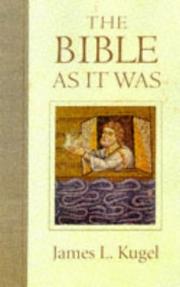
ISBN: 0674069404 Year: 1997 Publisher: Cambridge (Mass.): Harvard university
Abstract | Keywords | Export | Availability | Bookmark
 Loading...
Loading...Choose an application
- Reference Manager
- EndNote
- RefWorks (Direct export to RefWorks)
Bible --- 222.1 --- Octateuch. Heptateuch. Hexateuch. Pentateuch. Boeken van Mozes --- Bible. --- Chumash --- Five Books of Moses --- Ḥamishah ḥumshe Torah --- Ḥumash --- Kitāb-i Muqqadas --- Mose Ogyŏng (Book of the Old Testament) --- Pentateuch --- Pi︠a︡toknizhīe Moiseevo --- Sefer Ḥamishah ḥumshe Torah --- Tawrāh --- Torà (Pentateuch) --- Torah (Pentateuch) --- Tʻoris xutʻcigneuli --- Ureta --- תורה --- Haftarot --- Criticism, interpretation, etc. --- History. --- Bible. O.T. Pentateuch --- Criticism, interpretation, etc --- History --- Bible. - O.T. - Pentateuch - Criticism, interpretation, etc. - History.
Book
ISBN: 0300013523 Year: 1971 Publisher: New Haven, Conn.
Abstract | Keywords | Export | Availability | Bookmark
 Loading...
Loading...Choose an application
- Reference Manager
- EndNote
- RefWorks (Direct export to RefWorks)
Poetry --- French literature --- Poetry, Modern --- -Symbolism (Literary movement) --- Literary movements --- Modern poetry --- History and criticism --- Symbolism (Literary movement) --- History and criticism. --- Symbolism (Literary movement). --- POETRY --- SYMBOLISM
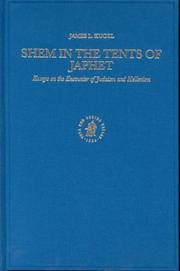
ISSN: 13842161 ISBN: 9004125140 900449667X 9789004125148 9789004496675 Year: 2002 Volume: 74 Publisher: Leiden; Boston : BRILL
Abstract | Keywords | Export | Availability | Bookmark
 Loading...
Loading...Choose an application
- Reference Manager
- EndNote
- RefWorks (Direct export to RefWorks)
These essays, by some of today's greatest scholars of Judaism and Hellenism in antiquity, explore a variety of ways in which these two great civilizations interacted. The common focus of these studies is the transition from one culture to the next - how words or concepts or conventions from the one came to be transplanted, and often modified in the process, in the other. Taken together, however, they provide something broader: a large, variegated picture of the cultural interaction that was to prove so crucial for the later history of Judaism and Christianity.
Judaism --- Greek literature, Hellenistic --- Hellenism --- Fathers of the Church, Greek --- Judaism and literature --- History --- Jewish authors --- History and criticism --- Philo, --- 933.32 --- 221.08*9 --- -Greek literature, Hellenistic --- -Hellenism --- Fathers of the church, Greek --- Greek fathers of the church --- Hellenistic Greek literature --- Jews --- Religions --- Semites --- Geschiedenis van het Joodse volk: hellenistische tijd--(332-63 v.Chr.) --- Theologie van het Oude Testament: relatie met het hellenisme --- -Jewish authors --- -History and criticism --- Religion --- Philo of Alexandria --- 221.08*9 Theologie van het Oude Testament: relatie met het hellenisme --- 933.32 Geschiedenis van het Joodse volk: hellenistische tijd--(332-63 v.Chr.) --- Literature and Judaism --- Literature --- Alexandria, --- Filon --- Filón, --- Filon, --- Filone, --- Philon, --- Philonis, --- Yedidyah, --- פילון --- פילון מאלכסנדריה --- פילון, --- פילון היהודי --- Филон Александрийский --- Filon Aleksandriĭskiĭ --- Pseudo-Philo --- Post-exilic period, 586 B.C.-210 A.D. --- Congresses --- Greek literature [Hellenistic ] --- Judaism - History - Post-exilic period, 586 B.C.-210 A.D. - Congresses. --- Greek literature, Hellenistic - Jewish authors - History and criticism - Congresses. --- Hellenism - Congresses. --- Fathers of the Church, Greek - Congresses. --- Judaism and literature - Greece - Congresses. --- Philo, - of Alexandria - Congresses. --- Philo, - of Alexandria
Book
ISBN: 9789004217683 9789004221109 9004217681 Year: 2012 Volume: 156 Publisher: Leiden Brill
Abstract | Keywords | Export | Availability | Bookmark
 Loading...
Loading...Choose an application
- Reference Manager
- EndNote
- RefWorks (Direct export to RefWorks)
Book of Jubilees --- Criticism, interpretation, etc. --- 229*202 --- Boek der Jubileeën --- Bible. --- Little Genesis --- Jubilees --- Livre des Jubilés --- Petite Genèse --- Buch der Jubiläen --- Kleine Genesis --- Liber Jubilaeorum --- Parva Genesis --- Jubiläenbuch --- Sefer ha-Yovlim --- 229*202 Boek der Jubileeën
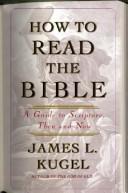
ISBN: 9780743235860 074323586X 9780743235877 0743235878 Year: 2008 Publisher: New York Free Press
Abstract | Keywords | Export | Availability | Bookmark
 Loading...
Loading...Choose an application
- Reference Manager
- EndNote
- RefWorks (Direct export to RefWorks)
How to Read the Bible is, quite simply, the best, most original book about the Bible in decades. It offers an unflinching, insider's look at the work of today's scholars, together with a sustained consideration of what the Bible was for most of its history -- before the rise of modern scholarship. Readable, clear, often funny but deeply serious in its purpose, this is a book for Christians and Jews, believers and secularists alike. It offers nothing less than a whole new way of thinking about sacred Scripture.
Bible. --- Criticism, interpretation, etc. --- 22 <036> --- 22 <036> Bijbel--Gidsen. Inleidingen --- 22 <036> La Bible. Ecriture sainte. Livres sacres--Guides. Intriductions --- Bijbel--Gidsen. Inleidingen --- La Bible. Ecriture sainte. Livres sacres--Guides. Introductions --- Antico Testamento --- Hebrew Bible --- Hebrew Scriptures --- Kitve-ḳodesh --- Miḳra --- Old Testament --- Palaia Diathēkē --- Pentateuch, Prophets, and Hagiographa --- Sean-Tiomna --- Stary Testament --- Tanakh --- Tawrāt --- Torah, Neviʼim, Ketuvim --- Torah, Neviʼim u-Khetuvim --- Velho Testamento
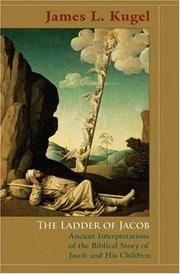
ISBN: 9780691141237 0691141231 0691121222 9780691121222 9781400827015 1400827019 9786612935435 1282935437 Year: 2006 Publisher: Princeton, N.J. : Princeton University Press,
Abstract | Keywords | Export | Availability | Bookmark
 Loading...
Loading...Choose an application
- Reference Manager
- EndNote
- RefWorks (Direct export to RefWorks)
Rife with incest, adultery, rape, and murder, the biblical story of Jacob and his children must have troubled ancient readers. By any standard, this was a family with problems. Jacob's oldest son Reuben is said to have slept with his father's concubine Bilhah. The next two sons, Simeon and Levi, tricked the men of a nearby city into undergoing circumcision, and then murdered all of them as revenge for the rape of their sister. Judah, the fourth son, had sexual relations with his own daughter-in-law. Meanwhile, jealous of their younger sibling Joseph, the brothers conspired to kill him; they later relented and merely sold him into slavery. These stories presented a particular challenge for ancient biblical interpreters. After all, Jacob's sons were the founders of the nation of Israel and ought to have been models of virtue. In The Ladder of Jacob, renowned biblical scholar James Kugel retraces the steps of ancient biblical interpreters as they struggled with such problems. Kugel reveals how they often fixed on a little detail in the Bible's wording to "deduce" something not openly stated in the narrative. They concluded that Simeon and Levi were justified in killing all the men in a town to avenge the rape of their sister, and that Judah, who slept with his daughter-in-law, was the unfortunate victim of alcoholism. These are among the earliest examples of ancient biblical interpretation (midrash). They are found in retellings of biblical stories that appeared in the closing centuries BCE--in the Book of Jubilees, the Aramaic Levi Document, the Testaments of the Twelve Patriarchs, and other noncanonical works. Through careful analysis of these retellings, Kugel is able to reconstruct how ancient interpreters worked. The Ladder of Jacob is an artful, compelling account of the very beginnings of biblical interpretation.
Jacob --- Bible. --- Criticism, interpretation, etc. --- 222.2 --- Genesis --- Īakov --- Israel --- Isrāʼīl (Biblical patriarch) --- Jacob, --- Jakob --- Yaʻaḳov --- Yaʻăqōb --- Yaʻqūb (Biblical patriarch) --- Yiśraʼel --- יעקב --- Be-reshit (Book of the Old Testament) --- Bereshit (Book of the Old Testament) --- Bytie (Book of the Old Testament) --- Chʻangsegi (Book of the Old Testament) --- Genesis (Book of the Old Testament) --- Sifr al-Takwīn --- Takwīn (Book of the Old Testament) --- Criticism, interpretation, etc., Jewish. --- RELIGION / Biblical Criticism & Interpretation / Old Testament. --- Jacob - (Biblical patriarch) --- Christianity.
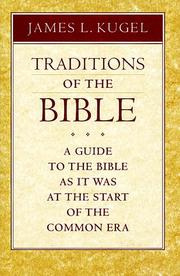
ISBN: 0674039769 9780674039766 9780674791510 0674791517 Year: 2022 Publisher: Cambridge, MA
Abstract | Keywords | Export | Availability | Bookmark
 Loading...
Loading...Choose an application
- Reference Manager
- EndNote
- RefWorks (Direct export to RefWorks)
James Kugel's The Bible As It Was (1997) has been welcomed with universal praise. Here now is the full scholarly edition of this wonderfully rich and illuminating work, expanding the author's findings into an incomparable reference work. Focusing on two dozen core stories in the Pentateuch--from the Creation and Tree of Knowledge through the Exodus from Egypt and journey to the Promised Land--James Kugel shows us how the earliest interpreters of the scriptures radically transformed the Bible and made it into the book that has come down to us today. Kugel explains how and why the writers of this formative age of interpretation--roughly 200 B.C.E. to 150 C.E.--assumed such a significant role. Mining their writings--including the Dead Sea Scrolls, works of Philo and Josephus and letters of the Apostle Paul, and writings of the Apostolic Fathers and the rabbinic Sages--he "es for us the seminal passages that uncover this crucial interpretive process. For this full-scale reference work Kugel has added a substantial treasury of sources and passages for each of the 24 Bible stories. It will serve as a unique guide and sourcebook for biblical interpretation.
Theology. --- Christian theology --- Theology --- Theology, Christian --- Christianity --- Religion --- Bible. --- Chumash --- Five Books of Moses --- Ḥamishah ḥumshe Torah --- Ḥumash --- Kitāb-i Muqqadas --- Mose Ogyŏng (Book of the Old Testament) --- Pentateuch --- Pi︠a︡toknizhīe Moiseevo --- Sefer Ḥamishah ḥumshe Torah --- Tawrāh --- Torà (Pentateuch) --- Torah (Pentateuch) --- Tʻoris xutʻcigneuli --- Ureta --- תורה --- Haftarot --- Criticism, interpretation, etc. --- History. --- 22.01 --- Bijbel:--inleiding
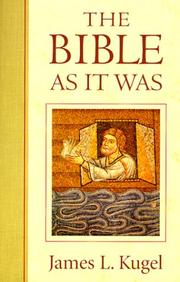
ISBN: 0674069412 9780674069411 Year: 1999 Publisher: Londres: Harvard university press,
Abstract | Keywords | Export | Availability | Bookmark
 Loading...
Loading...Choose an application
- Reference Manager
- EndNote
- RefWorks (Direct export to RefWorks)
Book
ISBN: 0300031017 Year: 1981 Publisher: New Haven (Conn.): Yale university
Abstract | Keywords | Export | Availability | Bookmark
 Loading...
Loading...Choose an application
- Reference Manager
- EndNote
- RefWorks (Direct export to RefWorks)
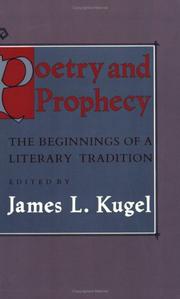
ISBN: 0801495687 Year: 1990 Publisher: Ithaca (N.Y.): Cornell university press
Abstract | Keywords | Export | Availability | Bookmark
 Loading...
Loading...Choose an application
- Reference Manager
- EndNote
- RefWorks (Direct export to RefWorks)
Mythology in literature --- Poetry --- Prophecy in literature --- History and criticism
| Listing 1 - 10 of 23 | << page >> |
Sort by
|

 Search
Search Feedback
Feedback About UniCat
About UniCat  Help
Help News
News